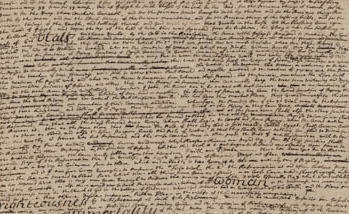Jonathan Edwards Collection
Writings and artifacts documenting the life of the theologian, missionary, and leader of the great Awakening.

Jonathan Edwards (1703-1758)
Jonathan Edwards, among the foremost theologians and philosophers of his time, was born in East Windsor, Connecticut, on October 5, 1703. He attended Yale College and graduated with a Bachelor of Arts in 1720. Upon leaving Yale, he succeeded his grandfather, Solomon Stoddard, as minister of the Congregationalist Church at Northampton, Massachusetts from 1726 to 1750. There he became known as an evangelical preacher and stern Calvinist, helping inspire the “Great Awakening” of the 1740s. His writings, which were widely circulated, included A Faithful Narrative and Sinners in the Hands of an Angry God. In 1751 he became a missionary to the Mahican and Mohawk Indians at Stockbridge, Massachusetts, and minister to the English congregation there. While at Stockbridge he continued writing treatises that expounded his theology, including Freedom of the Will and The End for Which God Created the World. In 1757, he accepted an offer to become the president of the College of New Jersey, now Princeton University. In March 1758 he received a smallpox inoculation which proved to be infected, and died.
The Collection
The collection consists of the great majority of Edwards’ surviving manuscripts including over one thousand sermons, private theological and philosophical notebooks, correspondence, printed materials, and artifacts.
History of the Collection
The bulk of the Jonathan Edwards Collection came to Yale as a gift of the heirs of Jonathan Edwards in 1900. Additional individual pieces, small groups of his papers, and especially, other family papers, have been added over the years, chiefly from other Edwards descendants.
Related Materials
Jonathan Edwards Center at Yale University, supports inquiry into the life, writings, and legacy of Jonathan Edwards by providing resources that encourage critical appraisal of the historical importance and contemporary relevance of America’s premier theologian.